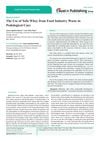 December 2023 in “Scientific reports”
December 2023 in “Scientific reports” Fermented soy protein may help prevent bone loss by affecting bone cell activity.
Polyglutamic acid is a valuable, sustainable ingredient for skincare and haircare products.
30 citations,
October 2020 in “Frontiers in Plant Science” Combined arsenic and low oxygen stress alters root growth to help plants absorb nutrients.
 9 citations,
February 2022 in “Genes”
9 citations,
February 2022 in “Genes” Women with PCOS have more Bifidobacterium in their gut compared to those without PCOS.
2 citations,
January 2020 in “Evidence-based Complementary and Alternative Medicine” Hataedock treatment improved skin health and reduced atopic dermatitis symptoms by enhancing the skin barrier and reducing inflammation.
 December 2024 in “Microorganisms”
December 2024 in “Microorganisms” Microbiota changes in deer antler velvet aid in wound healing and tissue regeneration.
 January 2024 in “Journal of applied biological chemistry”
January 2024 in “Journal of applied biological chemistry” Glehnia littoralis and Andrographis paniculata extracts can significantly boost hair growth.
February 2023 in “Medicine in novel technology and devices” Microneedles with traditional Chinese medicine can help regrow hair in androgenic alopecia.
 26 citations,
May 2021 in “International Journal of Molecular Sciences”
26 citations,
May 2021 in “International Journal of Molecular Sciences” Cheonggukjang may help prevent and manage various diseases and improve overall health, but its odor and safety concerns need addressing.
March 2024 in “Journal of functional biomaterials” A kimchi-derived bacterium could help whiten teeth and prevent bad breath.
 19 citations,
September 1995 in “Food and nutrition bulletin”
19 citations,
September 1995 in “Food and nutrition bulletin” Leucaena leucocephala is nutritious but needs careful processing to remove toxins.
 2 citations,
June 2023 in “Pharmaceutics”
2 citations,
June 2023 in “Pharmaceutics” Nanofiber scaffolds help wounds heal by delivering drugs directly to the injury site.
 18 citations,
October 2018 in “Nutrients”
18 citations,
October 2018 in “Nutrients” Annurca apple extract promotes hair growth by changing hair follicle metabolism to boost keratin production.
 97 citations,
May 2008 in “Journal of Cutaneous Pathology”
97 citations,
May 2008 in “Journal of Cutaneous Pathology” Different soft tissue fillers can cause various skin reactions; biodegradable fillers are safer and non-biodegradable ones like silicone can lead to long-term problems.
 5 citations,
January 2017 in “Elsevier eBooks”
5 citations,
January 2017 in “Elsevier eBooks” The document concludes that cosmetics need biocompatible, eco-friendly ingredients due to aging populations and demand for effective products.
4 citations,
March 2023 in “Molecules/Molecules online/Molecules annual” Gallic acid and ferulic acid can be sustainably extracted for hair supplements with high efficiency and stability.
 1 citations,
August 2023 in “Austin Chemical Engineering”
1 citations,
August 2023 in “Austin Chemical Engineering” Tofu whey improves foot skin health and supports sustainable cosmetics.
3 citations,
November 2022 in “Molecules/Molecules online/Molecules annual” The substances improved hair regrowth and protected hair cells in humans and mice.
 1 citations,
August 2024 in “Polymers”
1 citations,
August 2024 in “Polymers” Bacterial cellulose is a promising material for biomedical uses but needs improvements in antimicrobial properties and degradation rate.
 November 2024 in “Fermentation”
November 2024 in “Fermentation” Fermented ginsenosides from kimchi bacteria may promote hair growth better than finasteride.
 1 citations,
March 2020 in “Functional foods in health and disease/Journal of functional foods in health & disease”
1 citations,
March 2020 in “Functional foods in health and disease/Journal of functional foods in health & disease” OM-X® helped prevent negative effects of Vitamin C deficiency in mice, suggesting it could protect organs and regulate metabolism.
 February 2024 in “Bangladesh pharmaceutical journal”
February 2024 in “Bangladesh pharmaceutical journal” The conclusion is that the tested yogurts from Bangladesh are rich in vitamins thiamine and riboflavin, and the testing method is reliable.
 10 citations,
April 2019 in “Journal of Analytical Science and Technology”
10 citations,
April 2019 in “Journal of Analytical Science and Technology” Lactobacillus plantarum hydrolysates may help increase hair growth by boosting VEGF production.
 39 citations,
April 2019 in “Journal of Biomaterials Science, Polymer Edition”
39 citations,
April 2019 in “Journal of Biomaterials Science, Polymer Edition” RADA16 is a promising material for tissue repair and regenerative medicine but needs improvement in strength and cost.
 41 citations,
February 1970 in “Archives of Dermatology”
41 citations,
February 1970 in “Archives of Dermatology” Oral contraceptives can cause skin issues like dark patches, acne, yeast infections, sensitivity to light, spider veins, skin rashes, and hair loss.
 25 citations,
February 2017 in “Anticancer Research/Anticancer research”
25 citations,
February 2017 in “Anticancer Research/Anticancer research” Ozone therapy might improve cancer treatment and reduce its side effects.
 17 citations,
April 2020 in “Dermatology and Therapy”
17 citations,
April 2020 in “Dermatology and Therapy” The PRP-like cosmetic product with postbiotics effectively treats hair loss in Alopecia areata.
 10 citations,
August 2019 in “The World Journal of Men's Health”
10 citations,
August 2019 in “The World Journal of Men's Health” Kimchi probiotics slightly improved hair density, but more research needed.
 3 citations,
January 2021 in “Applied sciences”
3 citations,
January 2021 in “Applied sciences” Fermented red ginseng and a traditional herb mix improved hair growth in mice.
 1 citations,
December 2023 in “npj biofilms and microbiomes”
1 citations,
December 2023 in “npj biofilms and microbiomes” Single-cell engineered biotherapeutics show promise for skin treatment but need more research and trials.























